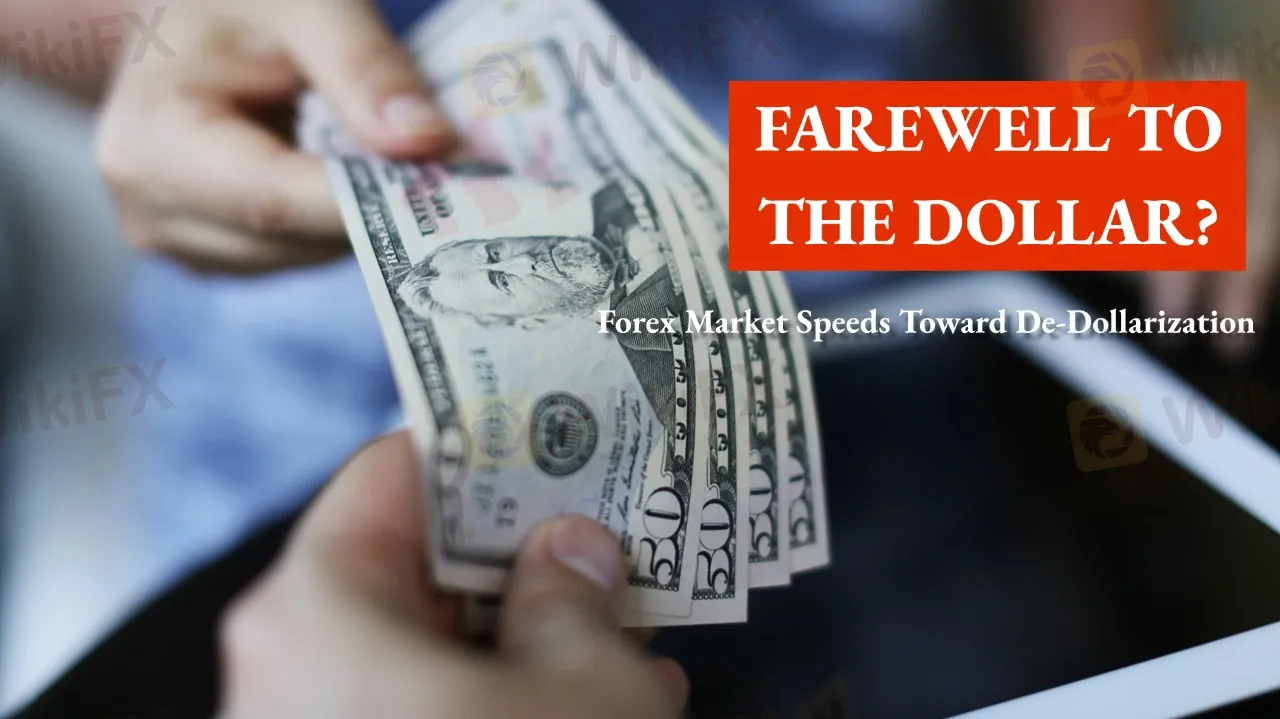简体中文
繁體中文
English
Pусский
日本語
ภาษาไทย
Tiếng Việt
Bahasa Indonesia
Español
हिन्दी
Filippiiniläinen
Français
Deutsch
Português
Türkçe
한국어
العربية
Farewell to the Dollar? Forex Market Speeds Toward De-Dollarization
Abstract:The dollar is losing its dominance? The forex market is witnessing a rapid shift toward de-dollarization, sparking serious investor attention.

Recently, the U.S. dollar has been under significant selling pressure in the forex market. Not only has it weakened against major currencies, but U.S. assets across the board—stocks, bonds, and the dollar itself—are facing simultaneous outflows.
Unlike typical crises where investors rush to hold dollars and U.S. Treasuries, the current trend shows them actively avoiding U.S. assets. This signals a potential erosion of long-held confidence in the dollar as a safe haven.
Mounting Challenges Push De-Dollarization into High Gear
Analysts from Deutsche Bank point out that the dollar is facing an unprecedented trust issue. On one hand, global demand for dollar-denominated assets is shrinking.
On the other, rising trade tensions with major economies have brought currency issues into the spotlight, further undermining market confidence.
What's more, concerns about the political use of dollar liquidity are prompting central banks and investors worldwide to reduce their reliance on the dollar. This de-dollarization trend is no longer theoretical—its accelerating in real time.
Official institutions are considering cutting back on U.S. Treasuries, and global contracts are increasingly shifting away from being dollar-denominated.
In this shifting environment, forex investors need to sharpen their risk radar. Diversifying away from dollar exposure is becoming a prudent strategy. Currencies like the euro, yen, and even the yuan are gaining attention as potential alternatives.
At the same time, traditional safe-haven assets like gold may see renewed demand, especially as concerns over global liquidity risks intensify.
Investors should also prepare for heightened volatility. Short-term trading strategies must be more sensitive to event-driven movements and policy signals. In the long term, it remains to be seen whether the dollar will lose its global dominance—but the current momentum toward de-dollarization is undeniable, and investors cant afford to ignore it.

Disclaimer:
The views in this article only represent the author's personal views, and do not constitute investment advice on this platform. This platform does not guarantee the accuracy, completeness and timeliness of the information in the article, and will not be liable for any loss caused by the use of or reliance on the information in the article.
Read more

Never Heard of Dynasty Trade? Here's Why You Should Be Worried
Have you heard this name before? No , it’s time you do because staying unaware could cost you. This platform is currently active in the forex trading and has been linked to several suspicious activities. Even if you’ve never dealt with it directly, there’s a chance it could reach out to you through ads, calls, messages, or social media. That’s why it’s important to know the red flags in advance.

WEEKLY SCAM BROKERS LIST IS OUT! Check it now
If you missed this week's fraud brokers list and are finding it difficult to track them one by one — don’t worry! We’ve brought together all the scam brokers you need to avoid, all in one place. Check this list now to stay alert and protect yourself from fraudulent brokers.

Catch the Latest Update on BotBro & Lavish Chaudhary
BotBro, an AI-based trading platform, became popular in India in 2024—but for negative reasons. Its founder, Lavish Chaudhary, who gained a huge following by promoting it heavily on social media. Since then, he has become well-known, but for many controversies. Let’s know the latest update about Botbro & Lavish Chaudhary.

Trading Other People’s Money | What Prop Firms Don’t Tell You
Proprietary (prop) trading firms have become increasingly popular. They give traders the chance to trade with larger amounts of money without risking their own savings. For many, this sounds like the perfect opportunity to grow faster and earn more. But while the benefits are appealing, there are also risks and hidden rules that traders must understand before joining a prop firm.
WikiFX Broker
Latest News
Global week ahead: Crunch time for trade talks as Trump's deadline nears
Top Wall Street analysts recommend these dividend stocks for regular income
Stock futures rise as U.S.-EU trade deal kicks off a hectic week for markets: Live updates
Samsung Electronics signs $16.5 billion chip-supply contract; shares rise
EU chief to meet Trump in Scotland in push to avoid a transatlantic trade war
Trump's trade deals and tariffs are on the chopping block in court. What happens next
AI is radically changing entry-level jobs, but not eliminating them
CNBC Daily Open: A week when everything happens
Currency Calculator


